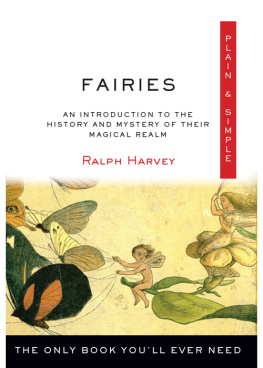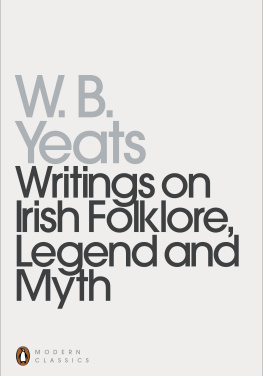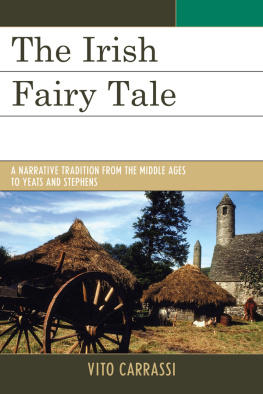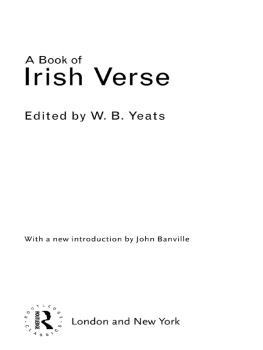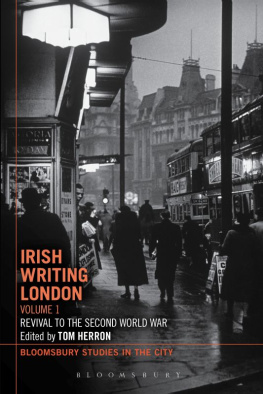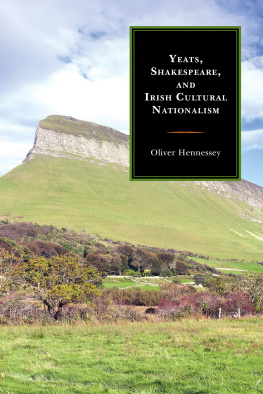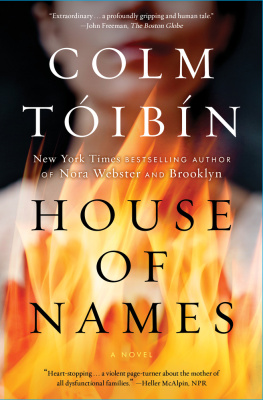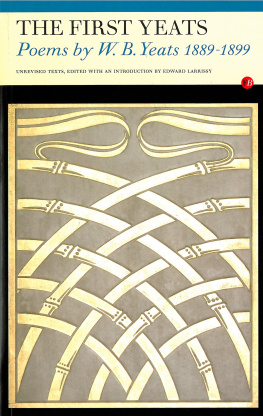INTRODUCTION.
Dr. Corbett, Bishop of Oxford and Norwich, lamented long ago the departure of the English fairies. "In Queen Mary's time" he wrote
"When Tom came home from labour,
Or Cis to milking rose,
Then merrily, merrily went their tabor,
And merrily went their toes."
But now, in the times of James, they had all gone, for "they were of the old profession," and "their songs were Ave Maries." In Ireland they are still extant, giving gifts to the kindly, and plaguing the surly. "Have you ever seen a fairy or such like?" I asked an old man in County Sligo. "Amn't I annoyed with them," was the answer. "Do the fishermen along here know anything of the mermaids?" I asked a woman of a village in County Dublin. "Indeed, they don't like to see them at all," she answered, "for they always bring bad weather." "Here is a man who believes in ghosts," said a foreign sea-captain, pointing to a pilot of my acquaintance. "In every house over there," said the pilot, pointing to his native village of Rosses, "there are several." Certainly that now old and much respected dogmatist, the Spirit of the Age, has in no manner made his voice heard down there. In a little while, for he has gotten a consumptive appearance of late, he will be covered over decently in his grave, and another will grow, old and much respected, in his place, and never be heard of down there, and after him another and another and another. Indeed, it is a question whether any of these personages will ever be heard of outside the newspaper offices and lecture-rooms and drawing-rooms and eel-pie houses of the cities, or if the Spirit of the Age is at any time more than a froth. At any rate, whole troops of their like will not change the Celt much. Giraldus Cambrensis found the people of the western islands a trifle paganish. "How many gods are there?" asked a priest, a little while ago, of a man from the Island of Innistor. "There is one on Innistor; but this seems a big place," said the man, and the priest held up his hands in horror, as Giraldus had, just seven centuries before. Remember, I am not blaming the man; it is very much better to believe in a number of gods than in none at all, or to think there is only one, but that he is a little sentimental and impracticable, and not constructed for the nineteenth century. The Celt, and his cromlechs, and his pillar-stones, these will not change muchindeed, it is doubtful if anybody at all changes at any time. In spite of hosts of deniers, and asserters, and wise-men, and professors, the majority still are averse to sitting down to dine thirteen at table, or being helped to salt, or walking under a ladder, or seeing a single magpie flirting his chequered tail. There are, of course, children of light who have set their faces against all this, though even a newspaper man, if you entice him into a cemetery at midnight, will believe in phantoms, for every one is a visionary, if you scratch him deep enough. But the Celt is a visionary without scratching.
Yet, be it noticed, if you are a stranger, you will not readily get ghost and fairy legends, even in a western village. You must go adroitly to work, and make friends with the children, and the old men, with those who have not felt the pressure of mere daylight existence, and those with whom it is growing less, and will have altogether taken itself off one of these days. The old women are most learned, but will not so readily be got to talk, for the fairies are very secretive, and much resent being talked of; and are there not many stories of old women who were nearly pinched into their graves or numbed with fairy blasts?
At sea, when the nets are out and the pipes are lit, then will some ancient hoarder of tales become loquacious, telling his histories to the tune of the creaking of the boats. Holy-eve night, too, is a great time, and in old days many tales were to be heard at wakes. But the priests have set faces against wakes.
In the Parochial Survey of Ireland it is recorded how the story-tellers used to gather together of an evening, and if any had a different version from the others, they would all recite theirs and vote, and the man who had varied would have to abide by their verdict. In this way stories have been handed down with such accuracy, that the long tale of Dierdre was, in the earlier decades of this century, told almost word for word, as in the very ancient MSS. in the Royal Dublin Society. In one case only it varied, and then the MS. was obviously wronga passage had been forgotten by the copyist. But this accuracy is rather in the folk and bardic tales than in the fairy legends, for these vary widely, being usually adapted to some neighbouring village or local fairy-seeing celebrity. Each county has usually some family, or personage, supposed to have been favoured or plagued, especially by the phantoms, as the Hackets of Castle Hacket, Galway, who had for their ancestor a fairy, or John-o'-Daly of Lisadell, Sligo, who wrote "Eilleen Aroon," the song the Scotch have stolen and called "Robin Adair," and which Handel would sooner have written than all his oratorios, and the "O'Donahue of Kerry." Round these men stories tended to group themselves, sometimes deserting more ancient heroes for the purpose. Round poets have they gathered especially, for poetry in Ireland has always been mysteriously connected with magic.



